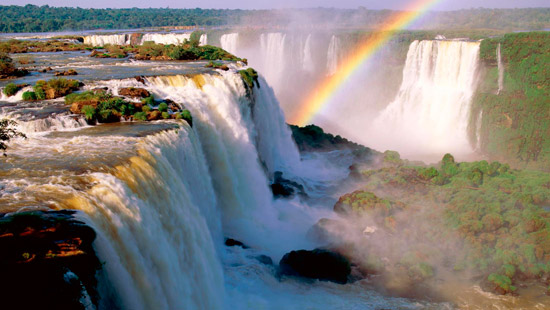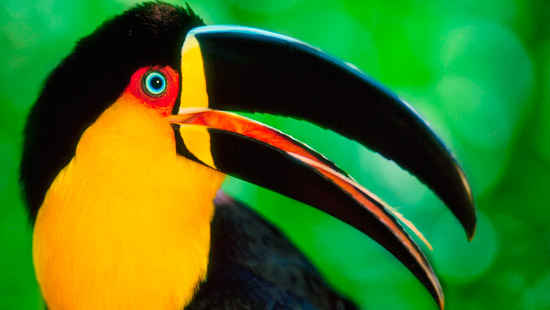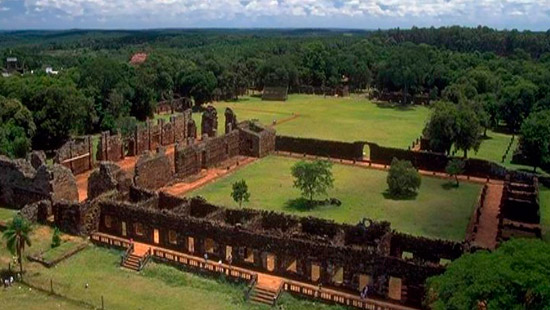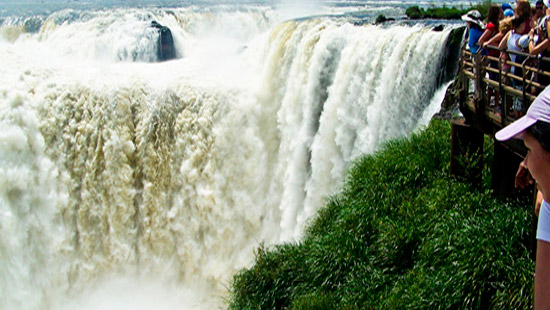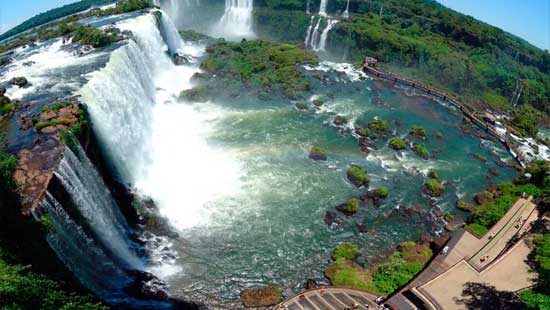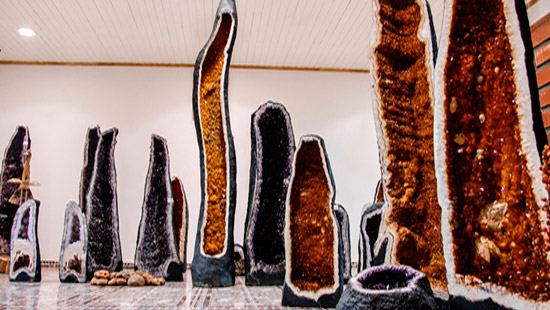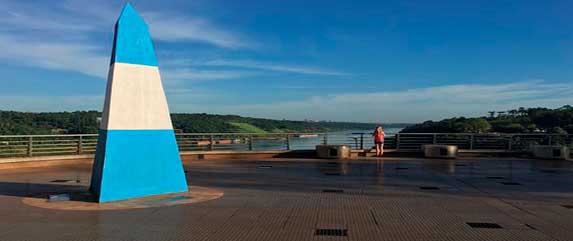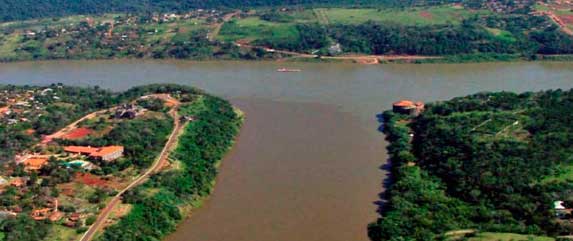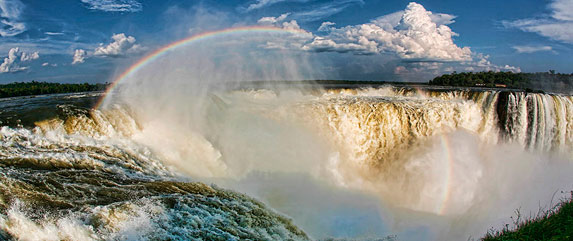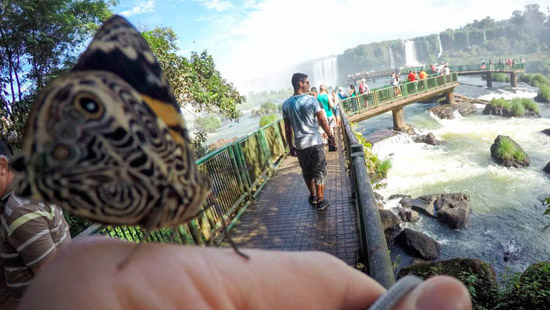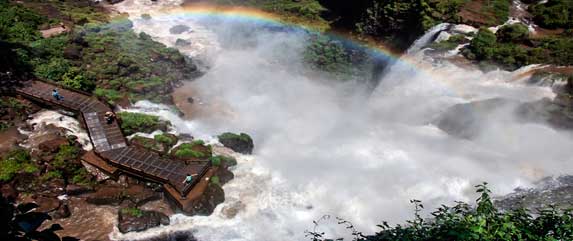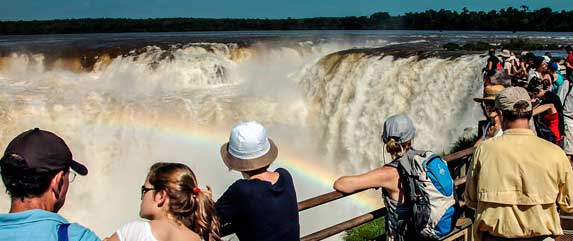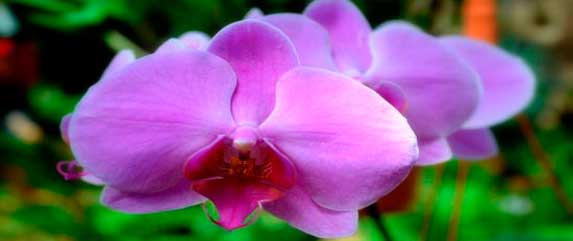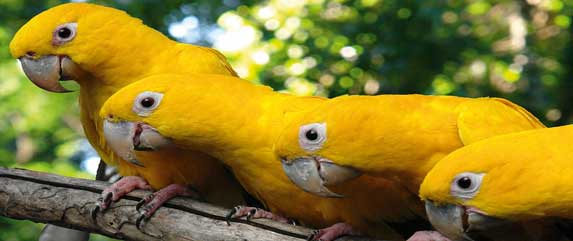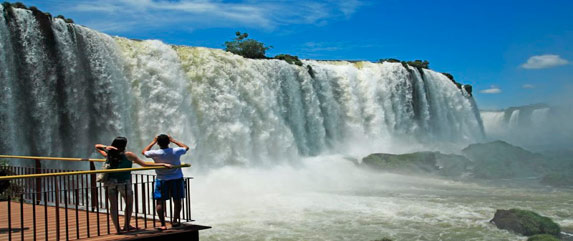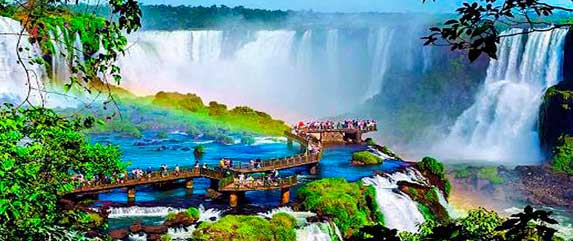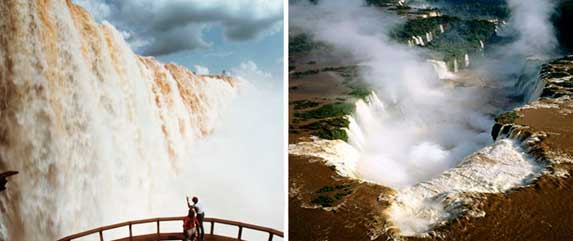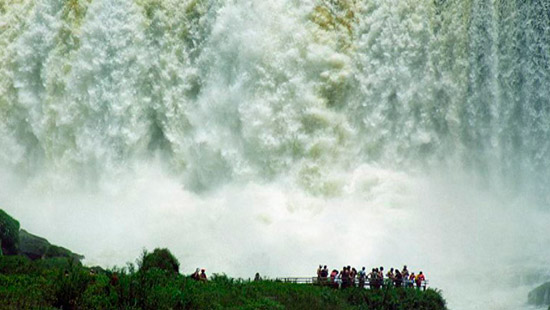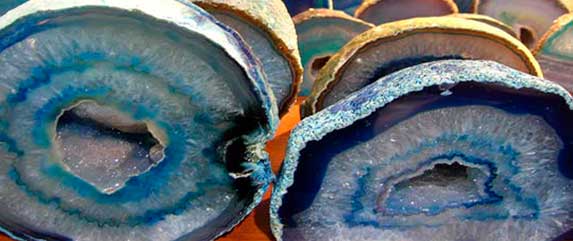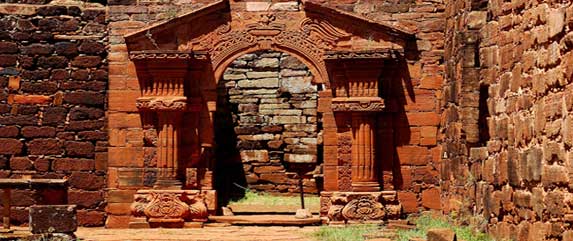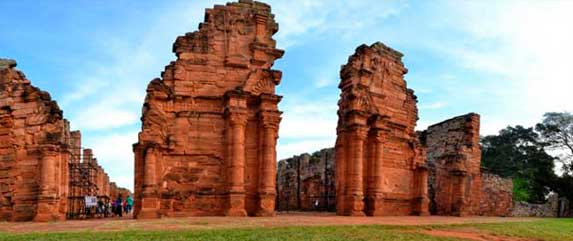At the confluence of the Río Paraná and the Río Iguazú, Puerto iguazú hosts most visitors to the Argentine side of Iguazú Falls, which are only 15 Km away. You can also, stay at Foz Do Iguaçu, on the Brazilian side, but you may need a Visa if you are American, Australian or Canadian.
Puerto Iguazú has a very irregular city plan, but fortunately is small enough to find yours way around easily. The main street is the diagonal Avenida Victoria Aguirre, which enters town in the south-east from national Ruta 12, but most tourist services are located just north of Avenida Victoria Aguirre in a rabbit warren of streets which cross each others at odd angles.
From the Hito Argentino, at the confluence of the river at the end of Avenida Tres Fonteras, you can see both Brazil and Paraguay. (The Hito Argentino is the Argentine landmark; all three countries have a landmark on their side of the Paraná and Iguazú river junction) .
Near the visitors centre at Parque Nacional Iguazú, a plaque credits Alvar Nuñez Cabeza de Vaca with discovery of the awesome Iguazú Falls in 1541, but he was at best the first European to view them. For the Guaraní Indians of the region and their predecessors, these impressive falls had been the source of legend for millennia.
According to Guaraní legend, the falls originated when an Indian warrior named Caroba incurred the wrath of a forest god by escaping down the river in a canoe with a young girl named Naipur, with whom the god had become infatuated. Enraged, the god caused the reverbed to collapse in front of the lovers, producing a line of precipitous falls over which Naipur fell and, at their base, turned into a rock. Caroba survived as a tree overlooking his fallen lover.
The geological origins of the falls are simpler and more prosaic. In southern Brazil, the Río Iguazú passes over a basaltic plateau which ends abruptly just east of the confluence with the Río Paraná. Where the lava flow stopped, at least 5000 cubic meters of water per second plunges more than 70 meters into the sedimentary terrain below during flood, the volume can be many times greater. Prior to reaching the falls, the river divides into many channels with hidden reefs, rocks and islands, which separate the many visually distinctive falls which together form the famous Cataratas. The falls themselves are more than two Km across.
You can see many of the falls up close via a system of pasarelas (catwalks) which offer unmatchable views. The most awesome is the semicircular Garganta del Diablo (Devil´s Troat), a deafening and dampening but indispensable part of the experience.
Parque Nacional Iguazú occupies a total area of about 55,000 hectareas, of which 6000 hectares constitute a Reserva Nacional which allows commercial development in the immediate area of the falls. Above the falls, the river itself is suitable for canoeing, kayaking and others water sports.
Others attractions are well worth seeing, including substantial areas of subtropical rain forest, with unique flora and fauna there are thousands of species of insects, hundreds of species of birds, and many mammals and reptiles.
Before seeing the falls themselves, have a quick look around the visitor centre, which has a small museum and, depending on the budget, information brochures. The tower near the visitor centre offers a good overall view, but walking around is the best way to see the falls. Plan your hikes before or after the midmorning influx of tours buses. At midday, you can take a break from the heat at the restaurant and confitería here.
Formerly, an interconnected series of catwalks led to all the falls from the visitor centre, but floods in 1983 destroyed a section and isolated those which go to Garganta del Diablo the single most impressive cascade. But nowadays the catwalks have been fixed and modernized You can see most of the falls by roaming at will on the trails and catwalks around the visitor centre; descending to the river, you can take a launch across to Isla Grande San Martín for return. Although the trip takes only a few minutes, the island offers views not available elsewhere and does insulate you from the masses on the mainland. Swimming and picnicking are popular activities. After returning to the mainland, you can catch a bus or taxi to Ñandú, where another catwalk leads across the river to the Garganta del Diablo.
After the trek, you will board very stable Canoes and sail to the Beagle Channel. You will go up to Isla de Lobos and Isla Redonda while viewing the Imperial Cormorants.Continuing your tour, you will disembark on the island to have a coffee break in a refuge where the native Yamaná Indian people used to live, while enjoying a spectacular view of the Beagle Channel. After the break, you will have some time to rest and in the early afternoon we will continue riding until you reach Lapataia Bay to see marine birds. Finally, you will return to Iguazu-falls by land at approximately 6 pm.
Of all the sights on earth, the Garganta del Diablo must come closest to the experience of sailing off the edge of the flat earth imagined by early European sailors. On three sides, the deafening cascade plunges to a murky destination; the vapor which soaks the viewer blurs the base of the falls. It is difficult to abandon a site of such menacing attraction, where you can still sense the awe which native people must have felt. Faced with this spectacle, early Spaniards showed only a practical indifference: Cabeza de Vaca reported that: ”… the current of the Yguazú was so strong that the canoes were carried furiously down the river, for near this spot there is a considerable fall, and the noise made by the water leaping down some high rocks into a chasm may be heard a great distance off, and the spray rises two spears high and more over the fall. It was necessary, therefore, to take the canoes out of the water and carry them by hand past the cataract for half a league with great labor…”
At least since 1943, when the Argentine government incorporated the area into its national park system, hundreds of thousands of visitors have felt much greater emotion than the Spanish explorers, but relatively few still venture beyond the immediate area of the falls to appreciate the park’s other scenery and wildlife.
Despite pressures for development and deforestation, Parque Nacional Igauzú presents a nearly pristine area of subtropical rain forest, with more 2000 identified plant species, countless insects, 400 species of birds, and many mammals and reptiles. High temperatures, rainfall and humidity encourage a diverse habitat.
Resembling the tropical Amazonian rainforest to the north, the forests of Misiones consist of multiple levels, the highest being a closed canopy of trees more than 30 meters in height. Descending, there are several additional levels of trees, plus a dense growth of shrubs and herbaceous plants on the ground. One of the most interesting species is the guapoy or strangler fig (Ficus Monckii), an epiphyte which uses a large tree for support until it finally asphyxiates its hosts. This species covers the ruins of many abandoned Jesuit Mission building elsewhere in the province.
Other epiphytes take advantage of their hosts without harming them. Orchids use the limbs of large trees such as the lapacho (Tabebui ipe) or palo rosa (Aspidosperma poluneuron) for support only, absorbing essential nutrients from rainfall or the atmosphere. At lower levels in the forest, you will find wild specimens of yerba mate (Ilexparaguariensis) which Argentines and others residents of the River Plate region use for tea.
Mammals and other wildlife are not easy seen in the park, because many are either nocturnal or avoid humans – which is not difficult in the dense undergrowth. This is the case, for instance, with large cats such as the puma and jaguar. The largest mammal is the tapir (Tapirus terrestris), a distance relative of the horse, but the most commonly seen is the coatimundi (Nasua nasua), related to the raccoon. It is not unusual to see iguanas and you should watch out for snakes.
Birds deserve special mention. Many of the species most of us normally see in pet shops can be found in the wild here. These include toucans, parrots, parakeets and other colorful species. The best time to see them is early in the morning along watercourse or in the forest, although the trees around the visitor centre do not lack flocks.
(Upper Circuit) Not a circuit at all but a path about 3,000 ft long- borders the ridge on the south side of the river, along the top of the falls. The trail leads across the rapid waters of the Brazo San Martín, a branch of the river, providing great views of Dos Hermanos, Bossetti, Chico, and Ramirez. The most powerful waterfall rising in front of you at the end is San Martín, the park’s widest. From the catwalk you look out upon a seemingly endless stretch of waterfalls whose white foams of fury don’t subside until they’re well down river. You can also see Isla San Martín and the Brazilian side, with the pink walls of the Hotel Das Cataratas peeking through the foliage. Count on about an hour and half to walk this fairly easy circuit, arrows on the path point you in the right direction (or you can just follow the crowds).
The tallest and most renowned waterfall, evocatively named the Garganta del Diablo (Devil´s Troat), is a breathtaking spectacle as it furiously spills over the precipice and plummets over 230 ft. The force of the water is so great that rising mist prevents you from seeing the bottom; as you stand and watch the river fall off into space, the awesome road below is your only confirmation that the water has reached its destination. Expect to get wet. The best viewing point is from the 1,000 ft-long catwalk that crosses over the river and leads right up to the gorge. To get to the catwalk, you need to take a boat from Puerto Canoas, a settlement 4 Km (2 ½ mi) up the river from the visitor center. The five minute boat trip runs several times each hour. Puerto Canoas has a basic campground with no facilities, 1 Km (1/2 ) farther on the banks of the Río Nandú ( Nandú River), along with a restaurant and a bar open for lunch only. The hourly bus from Puerto Iguazú to the national park ends its route at Puerto Canoas, and taxis are available at the visitor center. The whole excursion takes about two hours.
Add your outing to the different panoramic points overlooking the falls with a hike in the jungle. The Sendero Macuco (Macuco Trail), which extends 4 Km (2 ½ mi) into the jungle, ending at the Salto Arrechea (Arrechea Falls) farther downriver from the main falls, is maintained by the Centro de Investigaciones Ecológicas Subtropicales (Center for Subtropical Ecological Investigation). The trail is very carefully marked, and descriptive sings in Spanish explain the jungle’s flora and fauna. The closest you’ll get to a wild animal is likely to be a paw print in the dirt, though you may be lucky enough to glimpse a monkey.
The foliage is dense, so the most common surprised turn back at any point, or continue on to the refreshing view of the river and Salto Arrechea. The best time to hear animals calls and to avoid the heat is either early in the morning or just before sunset. The battalions of butterflies, also best seen in the intricate glistening cobwebs crisscrossing the trail are a treat in the dawn light. Plan on spending about three hours for the whole trip.
To reach the Brazilian side of the falls, take a Singer or Tigre bus from Puerto Iguazú over the Puente Internacional Tancredo Neves, witch commemorates the popular Brazilian President – elect who died before he could take office in 1985. The trip takes about half an hour.
If you are only crossing for the day, Australian, Canadian, Americans, etc citizens need a Visa to cross to Foz Do Iguaçu, so check in advance. The bus will drop you at the terminal at the city of Foz Do Iguaçu, from which you can catch the Transbalan bus marked “ Cataratas” to the falls. There is an admission charge to enter the park. The bus drops you at the park’s complex of hotels and parking lots, from which a hillside catwalk leads to the falls themselves. There is an excellent overview of the falls, but you cannot approach them as closely as on the Argentine side.
The Brazilian side of the falls is more commercial than the Argentine side. Below the parking lot there is a helicopter pad, with rides over the falls, but you should know that Argentine park officials have complained that low-flying choppers have disturbed wildlife, including nesting bird.
The Minas de Wanda (Mines of Wanda ) are two of the largest sites for semiprecious stone in Argentina. Volcanic activity 120 million years ago created the deposits of amethyst, crystal, quartz, topaz, and agate.
The two adjacent and nearly identical mines, the Compañía Minera Wanda and the Tierra Colorada are both about a mile off R12, where the bus lets you off and where you’ll be greeted by representatives from both mines trying to steer you to their establishments. From the bus stop you can walk or take one of the taxis normally waiting there to the mines. On the tours of the mines or workshops, guides (some speak English) explain how the stones are extracted, cut, and treated. Of course, the tours end in the gift shop, where semiprecious stone clocks, paperweights, jewelry, mobiles, ashtrays, and other items are sold; don’t count on any great bargains.
56 Km (36 mi) northeast of Posadas)
San Ignacio Miní is the best preserved and most frequently visited of the Jesuit Missions Ruins. The mission was originally established in 1610 in Guayrá, a region of present-day Brazil. In 1632 seeking refuge from Portuguese slave trades who were raiding the mission, capturing the native populations living there, and selling them in Brazil, the mission relocated to a spot near the Río Paraná. In 1695 it moved again, 3 ½ Km (2 mi) away, to where its ruins are today.
At the mission’s height in 1733, the mission had over 3,300 Guaraní inhabitants; there were never more than three Jesuits at any one time.
The mission’s layout was typical of others in the region- it had a school, a cemetery, a church, a school, and living quarters surrounding a central green. Where it stood out was in the development of music and the arts. It was one of the first music conservatories in the region, and the precision with which instruments were constructed and played here gained the mission fame throughout the New World and Europe. An excellent example of the stellar artwork created here remains on the façade of the church-the Hellenic columns and traditional Guaranì images sculpted by both the Jesuits and Guaranís into the red sandstone.
Shortly after the expulsion of the Jesuits in 1767, the mission was abandoned and left to the jungle. In the 1940, however, the National Commission of Historic Monuments began restoring the mission: What you see today is a mixture of the original building and new construction. One aspect that cannot be reproduced is the surrounding environment: The jungle was gradually cut down as the town of San Ignacio sprang up, and now ugly brick buildings peek behind the ruins and a mess of restaurants and artisan shops line the outside walls. It’s most likely that you’ll just stop in San Ignacio for a few hours. The small museum contains a model of the mission, original tiles, and various metal objects unearthed during the restoration.

